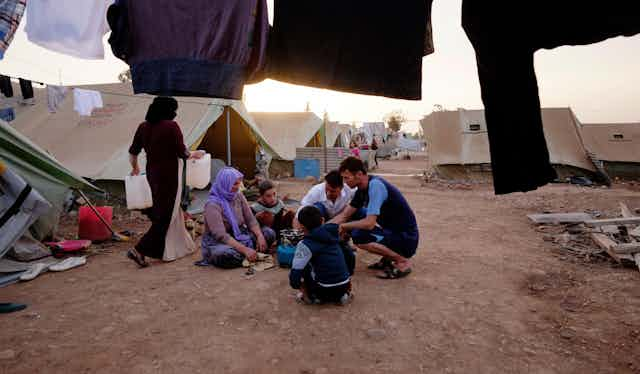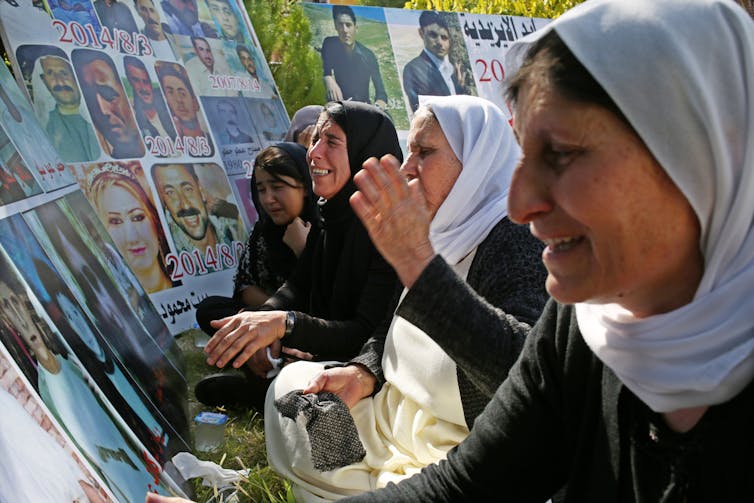

Luke Moffett consults to the International Organisation for Migration.
Queen's University Belfast apporte des fonds en tant que membre fondateur de The Conversation UK.
Voir les partenaires de The Conversation France
Ten years ago, on August 3, fighters from Islamic State (IS) left their bases in Syria and Iraq to attack the Sinjar region of north-western Iraq. Sinjar was home to the Yazidi people, a religious group native to the region. IS saw religious groups like the Yazidi as blasphemous and aimed to wipe them out.
Without much warning, around 350,000 Yazidis were forced to flee their homes and many sought refugee on Mount Sinjar, a mountain that the Yazidi see as sacred. Hundreds of children and elderly people died from dehydration and exposure as IS forces besieged the mountain. IS fighters were only pushed back a few days later by Iraqi and Kurdish troops, assisted by US airstrikes.
IS was prevented from wiping out all of the Yazidi on Mount Sinjar. But the group captured thousands of Yazidi men, women and children. All of the men were killed in front of their families, along with many elderly women and children. Some were even buried alive. The women and children who survived were taken to Syria, where they were sold and sexually enslaved by IS fighters.
IS also targeted and killed members of other minority groups in the area, such as the Shabak, Turkmen and Christians. According to the UN, over 5,000 Yazidis were killed and thousands more were abducted in a campaign that amounted to genocide.
A decade on, around 150,000 Yazidi survivors still live in tents in displaced person camps in Iraqi Kurdistan, a semi-autonomous region of northern Iraq.
The Iraqi government is trying to close down these camps, and has offered US$3,000 (£2,300) to those willing to return to Sinjar. But many people in the camps, as well as the tens of thousands who fled overseas, are still afraid to go back to their homes.

The likelihood that the Yazidi will be able to chart a future in Iraq remains very low. Former members of IS are being returned to Iraq from the Al-Hol detention camp in Syria without any reconciliation process with their victims.
In 2023, UN special rapporteur Fionnuala Ní Aoláin found that conditions in the Al-Hol camp were “dire and extreme”, and said an end to the detention of people there was “an absolute imperative”. Most of the former IS members detained in the camp had joined IS voluntarily, or were children taken to Syria by their parents to live in the “caliphate”.
One Yazidi survivor told me they would not return to Sinjar because the “crimes were committed by our neighbours [there] who have moved home already”. Nevertheless, the Iraqi government is committed to closing the displaced person camps.
Redressing genocide effectively means not only repairing the harm of those who have suffered, but preventing it from happening again. Paying compensation to survivors and providing plots of land is not enough to prevent genocide from recurring.
Until the root causes of the crimes committed by IS are addressed, Iraq risks seeing genocide happen again. It is no surprise that many Yazidis see their future outside of Iraq.